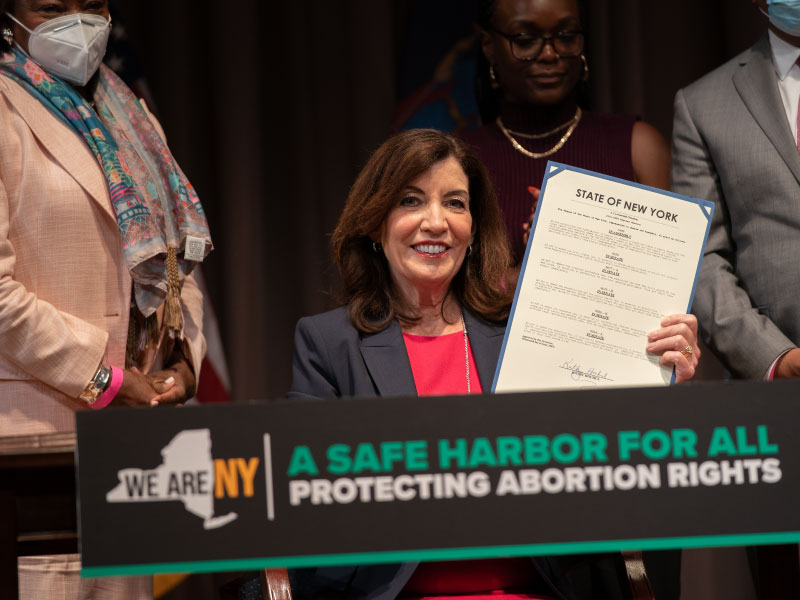Equity for women is dancing a political mambo — one step forward, and one step back. New York City Mayor Eric Adams has welcomed five women as deputy mayors, more than any previous administration, but women of color still feel excluded from city politics. Publications catering to female audiences are seeing readership spike, but this is in part a reaction to the Supreme Court ruling on June 24 overturning Roe v. Wade. Women in New York who identify as pro-choice may be celebrating Governor Hochul’s announcement last month to provide an additional $15 million to abortion and family planning providers, while at the same time mourning the end of an era in which bodily autonomy seemed guaranteed.
Abortion rights were codified into New York State law with passage of the Reproductive Health Act in 2019, and state as well as city officials have also taken recent steps to further protect and increase accessibility to reproductive health care. Just this month, the New York City Council passed a historic legislation package aimed at bolstering maternal health care for Black women and birthing people, who are eight times more likely to die from a pregnancy-related cause than white women in New York City.
Council Speaker Adrienne Adams has called the maternal health disparities “horrifying” and believes the legislation is “an important step to eliminate the inequities so that all women and birthing people are safe and protected.” Nodding to the importance of female political representation, Speaker Adams added, “When women are in leadership and the majority to make our laws, we lead on longstanding issues of significance that are critical to equitable access to health and safety.”
Governor Hochul and Mayor Eric Adams have also demonstrated leadership on this issue in recent months. Governor Hochul has enacted a requirement in the 2023 budget that health plans in New York must cover abortion services; she also expanded postpartum Medicaid coverage from 60 days to one year postpartum. Along with her runningmate, Lieutenant Governor Antonio Delgado, Governor Hochul was this month endorsed by the National Institute for Reproductive Health Action Fund PAC.
For his part, Mayor Adams signed six bills to strengthen abortion protections in the city, allow for free medication abortion at all New York City Department of Health and Mental Hygiene clinics, and improve public health education.
“In New York City, we stand in defense of abortion and reproductive rights,” said Deputy Mayor for Health and Human Services Anne Williams-Isom. “These are critical services that must remain accessible and available to every person that needs them. Abortion is health care and a lack of access to reproductive health care is a public health issue.”
While New York’s political leadership stepped forward to protect the right to choose, other policy issues disproportionately affecting women are still pushing them into a backstep. The pandemic upheaval has intensified the burden of childcare, for example, which still falls overwhelmingly to women. According to a report by the New York City Economic Development Corporation, the pandemic resulted in parents spending almost twice as much time on education and household tasks than they had pre-pandemic, with most of this additional labor falling to women. The report concludes: “The pandemic has been a blow to women, to mothers and, by extension, to families and their lifetime financial footing. This in turn has been a blow to NYC’s overall financial wellbeing. Our findings make a clear case that improving childcare access will be vital to the city’s full economic recovery.”
This sentiment is echoed by many of the honorees in this month’s Power Women section. When asked how policymakers can support the interests of women, childcare was often top of mind. Council Speaker Adrienne Adams, U.S. Senator Kirsten Gillibrand, New York City Deputy Mayor for Operations Meera Joshi, and Deputy Mayor for Strategic Initiatives Sheena Wright all referenced establishing accessible, affordable childcare as a necessary step toward achieving greater financial and gender equity.
“Universal childcare is an absolute necessity to support women across the state,” Deputy Mayor Wright said. “Having to change or leave careers to care for children, especially since the pandemic, disproportionately affects women. Income stability, career growth, and pay parity are all affected by supporting universal childcare.”
Evidently, the last few months have seen victories for women’s rights, incalculable losses, and many projects nowhere near completion. The result is an (at times frustrating) two-step of advancement and regression. But dances — even, and perhaps especially, political dances — are beautiful in their improvisation, resilience, and adaptability. When it comes to our current mambo, we should let women lead.






